Articles by Claudine Isaacs, MD
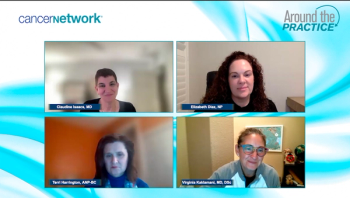
Panelists discuss ongoing clinical trials and how the treatment landscape for HR positive (HR+)/ HER2 negative (HER2-) breast cancer is evolving with novel targeted therapies and combination strategies, with Dr Isaacs highlighting the most exciting aspects of these trials and their potential impact on the future of precision medicine in this patient population.

Panelists discuss how the evolving treatment landscape, particularly with the introduction of new agents, has influenced Ms. Diaz's approach to patient education, highlighting strategies for staying informed and proactive, as well as ensuring effective coordination of care across multidisciplinary teams to optimize patient outcomes.

Panelists discuss strategies for patient education and monitoring hyperglycemia with PI3K inhibitors, including pre-treatment screening, baseline assessments, early recognition of adverse events, and supportive care measures such as dietary modifications, with Ms. Harrington sharing practical approaches and helpful resources; Dr Isaacs comments on potential differences in adverse event management, particularly hyperglycemia, between inavolisib, capivasertib, and alpelisib, offering practical advice for oncologists; and Dr Kaklamani explores how the varying safety profiles of these agents may influence treatment selection and sequencing, including the potential for inavolisib to become standard of care in the first-line PIK3CA-mutant setting and how this will affect PI3K inhibitor sequencing in later treatment lines.

Panelists discuss the key safety findings from the INAVO120 trial involving the inavolisib combination, highlighting aspects of its safety profile and how it compares with the safety data and clinical experience with other PI3K pathway inhibitors, noting any unique or notable differences.

Panelists discuss the prevalence of PIK3CA mutations in HR positive (HR+)/ HER2 negative (HER2-) breast cancer, their prognostic implications, and the critical role of identifying these mutations for personalized treatment planning, while Ms. Harrington shares insights on common patient questions about biomarker testing, the importance of molecular testing, and educational resources for helping patients understand their test results; Dr Kaklamani addresses how the approval of inavolisib may prompt routine PIK3CA mutation testing in the frontline setting, and Dr Isaacs and Ms. Diaz discuss the infrastructure changes needed in community practices to support this shift and the lessons learned from evolving biomarker testing practices.

Panelists discuss the prevalence of PIK3CA mutations in HR positive (HR+)/ HER2 negative (HER2-) breast cancer, their prognostic implications, and the critical role of identifying these mutations for personalized treatment planning, while Ms. Harrington shares insights on common patient questions about biomarker testing, the importance of molecular testing, and educational resources for helping patients understand their test results; Dr Kaklamani addresses how the approval of inavolisib may prompt routine PIK3CA mutation testing in the frontline setting, and Dr Isaacs and Ms. Diaz discuss the infrastructure changes needed in community practices to support this shift and the lessons learned from evolving biomarker testing practices.

Panelists discuss how the introduction of oral targeted therapies has transformed the patient experience by offering actionable treatment options for identifiable mutations, influencing prognosis and treatment discussions, and altering the nature of initial patient conversations, while Dr Isaacs highlights key efficacy and safety data from the INAVO120 trial and the implications of inavolisib’s PI3Kα-specific mechanism, and Dr Kaklamani addresses the evolving rationale for targeting truncal mutations earlier in treatment, emphasizing the role of combination therapies in first-line settings and trials such as ELEVATE/ELECTRA and CAPItello-292.

Panelists discuss how the October 2024 FDA approval of inavolisib in combination with palbociclib and fulvestrant for HR positive (HR+)/ HER2 negative (HER2-) metastatic breast cancer with a PIK3CA mutation marks a pivotal advancement in precision medicine, highlighting how agents like such as inavolisib, capivasertib, elacestrant, and alpelisib have transformed treatment approaches and expanded therapeutic options for patients.

Panelists discuss how emerging targeted therapies, including novel PI3K inhibitors and combination treatments, are advancing precision pathways in HR positive (HR+)/HER2 negative (HER2-) breast cancer, offering new hope for personalized treatment and improved patient outcomes.

15 Updated Expert Consensus Recommendations for Managing Hyperglycemia and Rash in Patients With PIK3CA-Mutated, Hormone Receptor–Positive (HR+), Human Epidermal Growth Factor Receptor 2–Negative (HER2–) Advanced Breast Cancer Treated With Alpelisib
ByEmily J. Gallagher,Heather Moore,Mario E. Lacouture, MD,Susan F. Dent,Azeez Farooki, MD,Marcus D. Goncalves,Claudine Isaacs, MD,Abigail Johnston,Dejan Juric,Zoe Quandt,Laura Spring,Brian Berman,Melanie Decker,Gabriel N. Hortobagyi, MD, FACP,Benjamin H. Kaffenberger,Bernice Y. Kwong,Timothy Pluard,Ruta Rao, MD,Lee Schwartzberg, MD, FACP,Michael S. Broder 
31 TIP TROPION-Breast03: Datopotamab Deruxtecan (Dato-DXd) ± Durvalumab vs Investigator’s Choice of Therapy (ICT) for Triple-Negative Breast Cancer (TNBC) with Residual Disease Following Neoadjuvant Therapy
ByAditya Bardia, MD, MPH, FASCO,Lajos Pusztai, MD, DPhil,Kathy S. Albain, MD,Kevin Kalinsky, MD, MS,Dawn Herman,William Barlow,Claudine Isaacs, MD,Micah Maxwell,Nadia Harbeck, MD, PhD,Priyanka Sharma, MD 
Neil Iyengar, MD; Claudine Isaacs, MD; Virginia Kaklamani, MD; and Vijayakrishna Gadi, MD, PhD, share clinical pearls for the evolving treatment landscape of HER+ metastatic breast cancer.
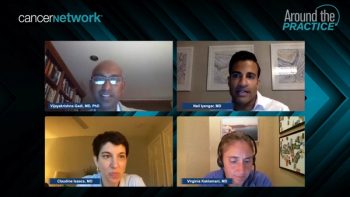
Vijayakrishna Gadi, MD, PhD, presents the case of a 63-year-old woman with grade 3 HER+/HR- metastatic breast cancer.
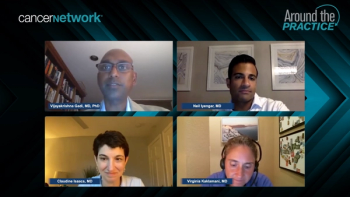
Breast cancer experts discuss the importance of patient quality of life when considering treatment recommendations for HER2+ breast cancer.
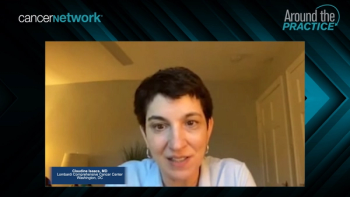
Claudine Isaacs, MD, comments on the follow-up and monitoring for a patient similar to the case presentation with HER2+ breast cancer.
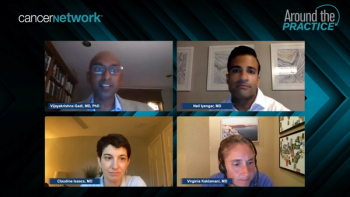
Experts in breast cancer discuss the management of visceral metastases in HER2+ breast cancer, and Vijayakrishna Gadi, MD, PhD, presents the case of a 50-year-old woman with HER+/HR- breast cancer.
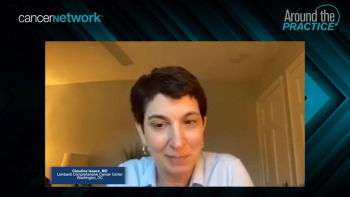
Vijayakrishna Gadi, MD, PhD; Claudine Isaacs, MD; Virginia Kaklamani, MD; and Neil Iyengar, MD, share their approach to treating patients with HER+ breast cancer who have brain metastases.
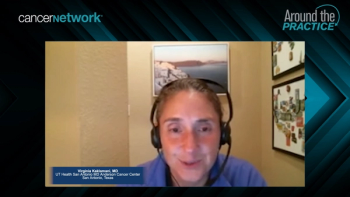
Breast cancer experts review unmet needs in the management of HER2+ metastatic breast cancer and updates from the 2021 ASCO virtual meeting.
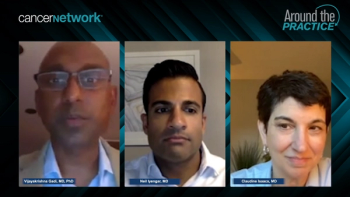
Neil Iyengar, MD, leads the discussion on the current standard of care and the sequencing of therapy for HER2+ metastatic breast cancer.

Genetic counseling and testing for susceptibility to breast and ovariancancer is often an integral component of management for womenwith a personal and/or family history of these malignancies. In thisarticle, we will briefly review the function and genetic epidemiology ofthe two major susceptibility genes, BRCA1 and BRCA2. We will thenaddress approaches to risk assessment for women at high risk with respectto the probability that they harbor a deleterious mutation in oneof these genes, and the likelihood that they will develop cancer if sucha mutation is identified. The process of genetic counseling and testingis discussed, including a summary of the potential benefits, limitations,and risks of testing as well as a summary of test result interpretation.We conclude with a review and appraisal of the various options forbreast and ovarian cancer risk reduction and screening options forwomen with a BRCA1 or BRCA2 mutation.

Although a substantial number of women will suffer and die from breast cancer during the upcoming years, we clearly have made stepwise progress in treating patients with this cancer over the last 3 decades. Each of these steps of progress has led to












